Soft Machine - 1 2 Architects Of Space Time
Download
Filename: soft-machine-1-2-architects-of-space-time.zip- MP3 size: 224.2 mb
- FLAC size: 2116.6 mb
Table of Contents
Tracks
| Track | Duration | Preview |
|---|---|---|
| Hullo Der | 0:52 | |
| A Certain Kind | 4:10 | |
| Dada Was Here | 3:25 | |
| Plus Belle Qu'une Poubelle | 1:01 | |
| Box 25/4 LID | 0:47 | |
| Lullabye Letter | 4:37 | |
| Hope For Happiness (Reprise) | 1:37 | |
| Thank You Pierrot Lunaire | 0:47 | |
| Have You Ever Bean Grean? | 1:23 | |
| Out Of Tunes | 2:30 | |
| Pataphysical Introduction (Part One) | 1:00 | |
| Joy Of A Toy | 2:49 | |
| We Did It Again | 3:46 | |
| A Concise British Alphabet - Part 2 | 0:12 | |
| Priscilla | 1:05 | |
| Dedicated To You But You Weren't Listening | 2:30 | |
| Why Am I So Short | 1:38 | |
| A Certain Kind | 4:10 | |
| Hope For Happiness | 4:20 | |
| A Concise British Alphabet (Part One) | 0:10 | |
| A Door Opens And Closes | 1:09 | |
| Why Am I So Short? | 1:38 | |
| Pig | 2:08 | |
| A Concise British Alphabet - Part 1 | 0:10 | |
| Box 25/4 Lid | 0:47 | |
| Pataphysical Introduction (Part Two) | 0:50 | |
| Pataphysical Introduction - Part 1 | 1:00 | |
| Why Are We Sleeping? | 5:31 | |
| So Boot If At All | 7:22 | |
| Save Yourself | 2:25 | |
| As Long As He Lies Perfectly Still | 2:30 | |
| Orange Skin Food | 1:52 | |
| Pataphysical Introduction - Part 2 | 0:50 | |
| A Concise British Alphabet (Part Two) | 0:12 | |
| 10.30 Returns To The Bedroom | 4:14 | |
| Fire Engine Passing With Bells Clanging | 1:50 | |
| Hibou Anemone And Bear | 5:58 | |
| Plus Belle Q'une Poubelle | 1:01 |
Images
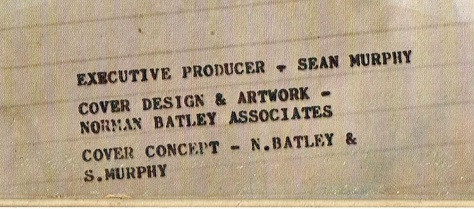
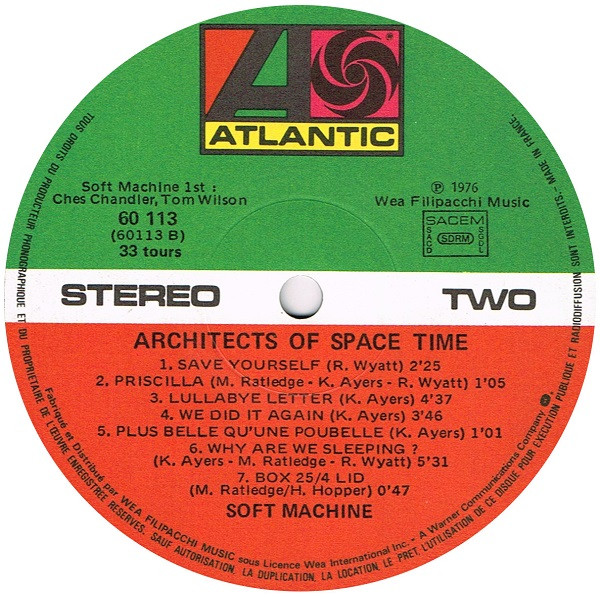
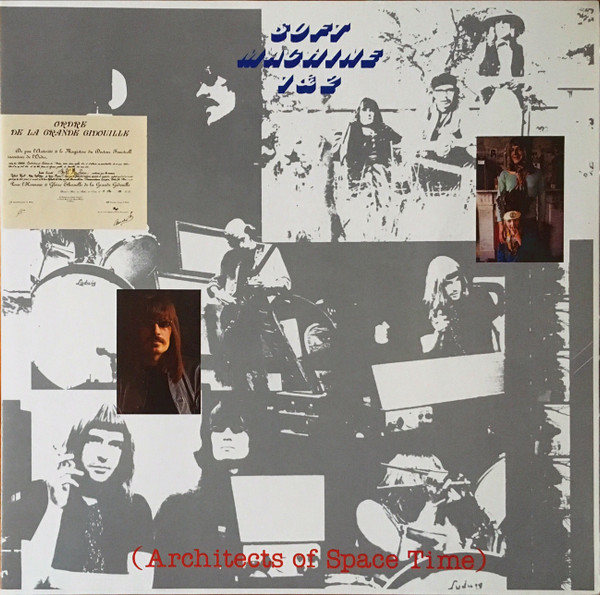
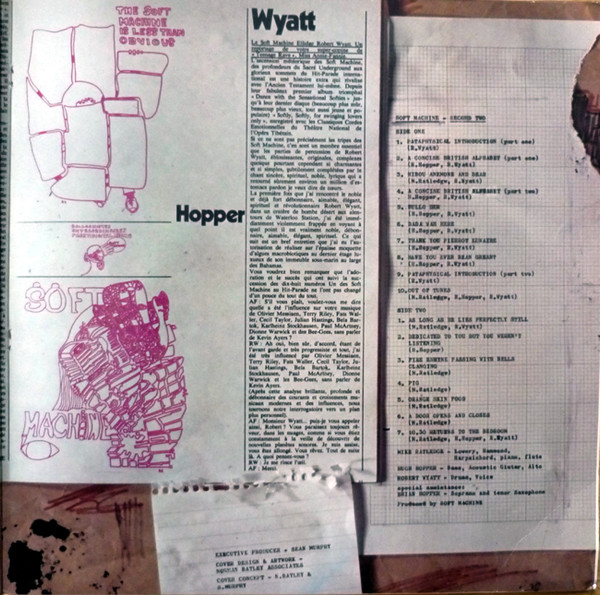
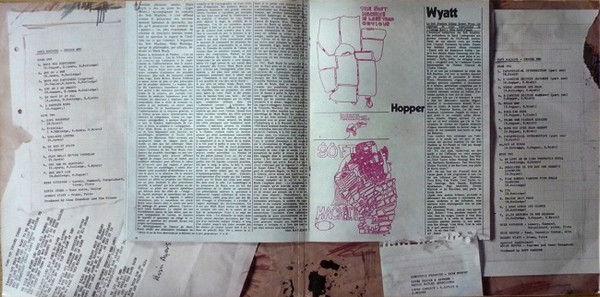
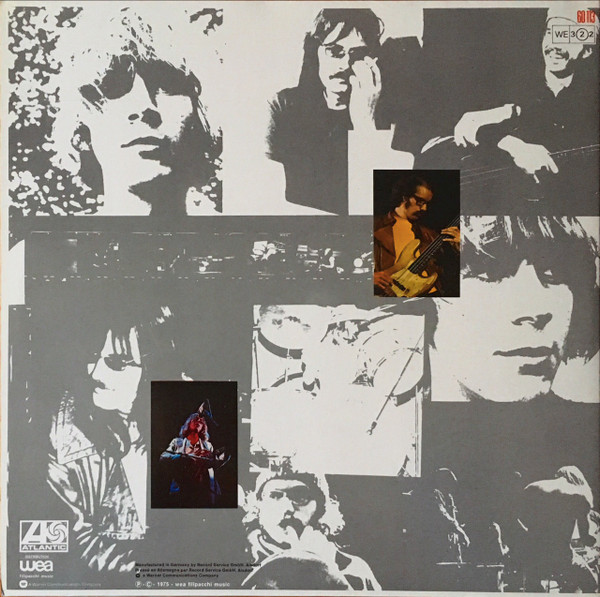
Catalog Numbers
- 60 113, 60 113_O
- 460 113
- 60113
- 60 113, 60 113-O
- 60 113, 60 113-0
Labels
- Atlantic, ATCO Records
- Atlantic
- ATCO Records
Listen online
- ascolta in linea
- lyssna på nätet
- écouter en ligne
- escuchar en línea
- online anhören
- lytte på nettet
- ouvir online
- kuunnella verkossa
- online luisteren
Formats
- 2 × Vinyl
- LP
- Compilation
- Reissue
- Cassette
- Stereo
- Gatefold
Companies
| Role | Company |
|---|---|
| Licensed From | WEA International Inc. |
| Distributed By | WEA Filipacchi Music |
| Phonographic Copyright (p) | WEA Filipacchi Music |
| Copyright (c) | WEA Filipacchi Music |
| Manufactured By | Record Service GmbH |
| Pressed By | Record Service Alsdorf |
| Record Company | Atlantic |
Credits
| Role | Credit |
|---|---|
| Artwork | Norman Batley Associates |
| Design | Norman Batley Associates |
| Bass Vocals | Kevin Ayers (tracks: A1 to B7) |
| Guitar | Kevin Ayers (tracks: A1 to B7) |
| Bass | Hugh Hopper (tracks: C1 to D7) |
| Acoustic Guitar | Hugh Hopper (tracks: C1 to D7) |
| Alto Saxophone | Hugh Hopper (tracks: C1 to D7) |
| Design Concept | N. Batley, S. Murphy |
| Drums | Robert Wyatt |
| Voice | Robert Wyatt |
| Executive-Producer | Sean Murphy |
| Illustration | Hopper |
| Lacquer Cut By | RME |
| Organ [Lowery | Mike Ratledge |
| Hammond] | Mike Ratledge |
| Harpsichord | Mike Ratledge |
| Piano | Mike Ratledge |
| Flute | Mike Ratledge |
| Liner Notes | Mike Ratledge |
| Producer | Chas Chandler (tracks: A1 to B7), Soft Machine (tracks: C1 to D7), Tom Wilson (tracks: A1 to B7) |
| Soprano Saxophone | Brian Hopper (tracks: C1 to D7) |
| Tenor Saxophone | Brian Hopper (tracks: C1 to D7) |
| Cover | N. Batley, S. Murphy |
| Vocals | Kevin Ayers (tracks: A1 to B7) |
| Engineer | George Chkhantz (tracks: C1 to D7) |
| Organ | Mike Ratledge |
Notes
- Odd release with mixed labels:
- Disc 1 has Atlantic green/orange center labels.
- Disc 2 has ATCO grey/white center labels.
- Gatefold sleeve shows only the Atlantic logo.
- Catalogue numbers : "60 113" on back sleeve and labels / "60 113_O" on spine
- On inner gatefold, this French release contains an interview of Robert Wyatt (in French) by Miss Annie-Fannie , also an extract of an article (in French) written by Mike Ratledge and an extract of the lyrics for the song "SONG FOR INSANE TIMES" by Kevin Ayers
- _____________________________________________________
- Manufactured in Germany by Record Service GmbH. Alsdorf
- Pressé en Allemagne par Record Service GmbH. Alsdorf
- A Warner Communication company
- On labels:
- ℗ 1976 Wea Filipacchi Music
- On back cover:
- ℗ - © - 1975 - wea filipacchi music
- Same track listing as the vinyl double LP.
- Double durée Cassette
- Orange K7 and Orange Jewel Box
- ℗ 1977
- Made in France
- This French release contains, on inner spread, an interview by Miss Annie-Fannie of Robert Wyatt, also an extract of an article written by Mike Ratledge and an extract of a song called "SONG FOR INSANE TIMES" by Kevin Ayers
- Gatefold cover
- ℗ 1976
- Wea Filipacchi Music
- The other similar release has different text arrangement on the center labels
- The texts on the label are written in French, English & German.
- Réf 60 113-0 on the spine
- Back cover shows:
- a Warner Communications Company
Barcodes
- Matrix / Runout (Runout side A): R / S Alsdorf 60113 A 15 RME
- Matrix / Runout (Runout side B): R / S Alsdorf 60113 B 16 F [unidentifiable signature] RME
- Matrix / Runout (Runout side C): R / S Alsdorf 60113 C 11 RME
- Matrix / Runout (Runout side D): R / S Alsdorf 60113 D F RME
- Matrix / Runout (Side A, center label): 60113-A
- Matrix / Runout (Side B, center label): 60113-B
- Matrix / Runout (Side C, center label): 60113-C
- Matrix / Runout (Side D, center label): 60113-D
- Rights Society: SACEM SACD SDRM SGDL
- Price Code: WE 3②2
- Label Code (on labels disc 1): LC 0121
- Label Code (on labels disc 2): LC 0120
- Matrix / Runout (A-side, stamped): WEA 60113 A MPO
- Matrix / Runout (B-side, stamped): WEA 60113 B MPO
- Matrix / Runout (C-side, stamped): WEA 60113 C MPO
- Matrix / Runout (D-side, stamped): WEA 60113 D MPO
- Matrix / Runout (A-side, center label): 60113 A
- Matrix / Runout (B-side, center label): 60113 B
- Matrix / Runout (C-side, center label): 60113 C
- Matrix / Runout (D-side, center label): 60113 D
- Other (back cover): WE 3②2
- Label Code: LC 0120
- Matrix / Runout (Runout stamped A side): R/S Alsdorf 60113 A
- Matrix / Runout (Runout stamped B side): F R/S Alsdorf 60113 B
- Matrix / Runout (Runout stamped C side): R/S Alsdorf 60113 C
- Matrix / Runout (Runout stamped D side): R/S Alsdorf 60113 D
- Matrix / Runout (Runout etched four side): RME
- Rights Society: GEMA / Biem
About Soft Machine
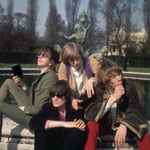

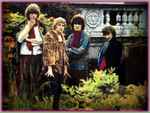
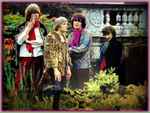

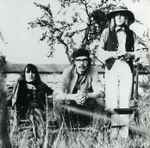
Soft Machine are an English rock and jazz band from Canterbury formed in mid-1966, named after the novel The Soft Machine by William S. Burroughs.
Australian poet, guitarist, singer, composer and performance artist moved to Paris in 1960. Inspired by the emerging 'Beat Generation' of writer's works he'd discovered whilst working in a Melbourne bookshop he moved into a room in Paris's 'Beat Hotel' and spent time around the city's Latin Quarter. There, he rubbed shoulders with and , gaining free access to the area's jazz clubs. Influenced by the music philosophies of he formed the , a free-jazz outfit which performed in Burroughs' theatre pieces based on that writer's novel 'The Ticket That Exploded'.
In 1961 Allen travelled to Canterbury, England, where he met 16 year-old (who was the son of his landlord). Their mutual interest in jazz resulted in a few gigs, in London in 1963, as the Daevid Allen Trio (with on bass and occasionally guesting on piano). Around the same time, Wyatt formed the with the Hopper brothers, Hugh and Brian Hopper, with on vocals.
The impetus behind the formation of occurred in a meeting of Daevid Allen and Kevin Ayers with Texan millionaire Wes Brunson in Deya, Majorca, on Easter Sunday 1966. Brunson agreed to put up the money for a new band, which allowed the group to buy equipment and rent a rehearsal room near Canterbury. The original line-up consisted of Robert Wyatt on drums and vocals, Mike Ratledge on keyboards, Daevid Allen on guitar and Kevin Ayers on bass and vocals. From May 1966 they gigged as Mister Head (aka Mr Head) and became Soft Machine in August 1966.
The name was taken from a William S. Burroughs novel 'The Soft Machine' (part of The Nova Trilogy), with agreement from the author. The title The Soft Machine encapsulates the Human Body, and the main theme of the book - as explicitly written in an appendix - concerns how control mechanisms invade the body. One poem, entitled Mens (Man, as in 'human'), by Dutch-American hematologist and poet Leo Vroman starts with the line: "Man is a soft machine..."
Mike Ratledge says of this : "... Soft machine was a generic term for the whole of humanity, and we were all soft machines... I guess our basic assumption was that what we liked, everybody else was going to like as well, that we all had things in common, and therefore we all are soft machines, and we were all going to like Soft Machine music. It might have been a false assumption, but I hope it's true".
In January 1967, the band's first single release, , was recorded.. Celebrating its release on February 22nd 1967 the band gave a press conference at The Speakeasy, performing that evening at The Roundhouse as the opening act for the - where Hendrix jammed with them on bass.
Allen recalls their introduction to The Speakeasy by , the promoter, producer, founder of the Crawdaddy Club and original manager of both and ;
He would take us there and ply us with whiskeys on the expense account. Wed meet all the big stars at the time. It was like being at court, only a rock n roll court. Cause were there, the Rolling Stones were there everybody, all the big names, would gather at the Speakeasy at this particular time.
.
Three months later, a collection of demos was recorded at DeLane Lea Studios with producer , but not officially released until 1971 as two compilations on the French label. At that time, Soft Machine had already become something of a 'cult' band on the London psychedelic scene, gigging at places like the Zebra Club, The Marquee, The Roundhouse, UFO (Underground Freak Out club) and Middle Earth. Light shows were also developed with Mark Boyle's Sensual Laboratory. On April 29th, 1967, they took part in the '14 Hour Technicolor Dream', an event set up by the underground paper 'International Times', which also featured , , , , , , and artists such as and .
During the summer of 1967 the band toured France, performing at psychedelic events along the Cote dAzur such as s
Sunlove Happening
and s
La Nuit Pschedelique
. For three weeks they provided daily musical
transmissions hallucinatoires
for wildly popular performances of
Le Désir Attrapé par la Queue
, a Pablo Picasso play produced by Lebel at the Festival de la Libre Expression outside Saint-Tropez. A legendary performance of
Do It Again
helped Soft Machine to make an enormous impression in France and, by the end of the Summer of Love, they became the favorite band of the French avant-garde.
On the way back Daevid Allen was refused re-entry to England and stayed in France, moving on to various projects before forming two years later, while Robert Wyatt, Mike Ratledge and Kevin Ayers decided to carry on Soft Machine as a trio.
In February 1968, Soft Machine embarked on a three month US tour (opening for the ), recording their first album during their touring schedule in New York in four days in April 1968, with production handled by Tom Wilson and former bassist and Hendrix producer . Although quickly made and not particularly well-recorded, the band's eponymous album (1968) is now considered a classic of the extraordinarily creative post-psychedelic and pre-progressive period of the late 1960's.
The band split up in December 1968, re-formed in February 1969 and carried on until the late 1970's through many line-up changes and leaving no original member onboard. It re-formed briefly in 1980 and 1984. Robert Wyatt formed in October 1971. "Matching Mole" is a clever mis-pronounciation of "La Machine Molle
Name Vars
- Karl Jenkins' Soft Machine
- Soft Machine & Heavy Friends
- Soft Machine Family
- Softmachine
- The Original Soft Machine
- The Original Soft-Machine
- The Soft Machine
- ¶û½ÕÈûÞ·üó
- ½ÕÈûÞ·üó
Members
- Robert Wyatt
- Daevid Allen
- Kevin Ayers
- Andy Summers
- Jack Bruce
- Hugh Hopper
- Elton Dean
- Theo Travis
- Nick Evans
- Mike Ratledge
- Lyn Dobson
- Marc Charig
- Karl Jenkins
- John Marshall
- Roy Babbington
- Allan Holdsworth
- Ric Sanders
- Ray Warleigh
- Alan Wakeman
- Phil Howard
- Fred T. Baker
- Steve Cook
- Asaf Sirkis
- John Etheridge
Related albums
Top Albums
Kenneth Glover - Lord Here Am I
Various - Anacreonticks The Golden Age Of Song Authentic English Music And Drinking Songs For Clubs Societies Wine Cellars Licensed Taverns Music Halls And Pleasure Gardens

Micro - 25th Year Micro Rock Lek Lek
Ghoul - Be Alive Or Dead
الحاج عبد الرحمن بنموسى - القرآن الكريم سورة الفاتحة وماتيسر من سورة البقرة سورة آل عمران سورة الجن
W B Yeats Jim Norton, Denys Hawthorne, Nicholas Boulton And Marcella Riordan - The Great Poets
Various - Outer Forms Vol2
Pyotr Ilyich Tchaikovsky - Concerto N1 Pour Piano Et Orchestre En Si Bémol Mineur Op 23
Captain Bass & Kryptoz - Dream VIP Danger VIP
Liza Lehmann, Elizabeth Harwood, Bernadette Greevy, Philip Langridge, Forbes Robinson, John Constable - In a Persian Garden
Florence K avec Norm Zabala, Éric Lagacé, Wali Muhammad - Live Au Lion Dor
Steel - Do You Know Who I Am
